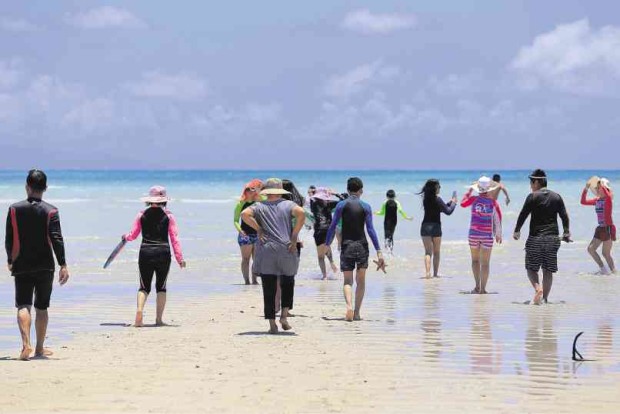
VISITORS walk on the sandbar that has earned the name “vanishing island,” during low tide in Salvacion village in Malilipot town, Albay province. MARC ALVIC ESPLANA/INQUIRER SOUTHERN LUZON
In the waters off the coast of Salvacion village in Malilipot town in Albay province hides a little piece of heaven.
As the tide recedes, a glistening sandbar, known in the town as “Vanishing Island,” appears under clusters of tents, sheds and floating cottages.
The crystal-clear water surrounding the sandbar teems with starfish and other marine species, attracting tourists to this spot that locals call “Wara-wara” (Bicol term for “disappearing”), since it only appears during low tide.
“It’s a mere sandbar but definitely, it will give you an island experience. The provincial tourism office named it Vanishing Island to make it more appealing to the international market, and to leave something in the minds of people,” said Maria Ana Bañadera, in charge of tour promotion of the Provincial Tourism Cultural Affairs Office.
Sandy Balimbing, village chief of nearby San Antonio Santicon, said locals believed that storms that hit the province helped form the sandbar, which is about 200 meters from the shore.
“I lived here for 40 years and this was only a plain, ordinary sea. But as typhoons hit the province, huge waves formed the sand into a slope,” said Balimbing.
Discovery
Bañadera said she and some guests discovered the Vanishing Island by accident during a tour in 2013.
While accompanying 12 tourists on their island-hopping, Bañadera said the group’s boat hit the sandbar. “Instead of staying on our banca, we went down and explored the sandbar for almost four hours,” she said.
Since then, the sandbar has been made part of stops in the province’s island-hopping tour package.
Despite its accessibility, visiting the sandbar requires timing, as visitors need to wait for the low tide.
Bañadera said the sandbar would appear 45 minutes after the scheduled low tide each day, so the leisure opportunity would depend on the cycle.
“If the low tide today is at 10 a.m., the next day, the sandbar would appear at 10:45 a.m., and so on. Some tour guides are not familiar with the tide cycle that is why they find it difficult to compute water levels. We can always use different phone applications to determine [the best time to visit],” she said.
Low tide lasts for almost six hours in a day, allowing visitors time to explore the sandbar, Bañadera said.
Leisure activities
The hectare-wide sandbar has become popular among budget travelers because of the relatively cheap cost of getting there.
Tourists are also attracted by the reasonably priced accommodation and food. Floating cottages, tents and sheds can be rented for P300 to P400.
Heide Bobiles, 47, sells grilled squid, fish and crabs for P50 to P100 per plate. Other seafood, vegetables and cooked meals are sold at P20 to P30 per serving.
Bobiles started selling food and souvenirs, and offering other services in February, when the spot started attracting tourists. Locals have since become part of the development of the place, as they also ensure that the area is kept clean.
Paz Borbe, 58, also saw an opportunity to earn extra money from selling fresh and cooked seafood to tourists. Borbe said she earned at least P1,500 from selling seafood and renting out tents.
Potential
When Bañadera realized the potential of the sandbar to become a key area in Albay tourism, she organized a summit for all tour operators and owners of beach resorts and other tourism-related businesses to introduce the new attraction.
The sudden popularity of the Vanishing Island has given residents in nearby communities extra income. The 12 floating cottages opened for rentals as retail stores, small eateries and pay toilets were established near the Bacacay port in Bacacay town, said Bañadera.